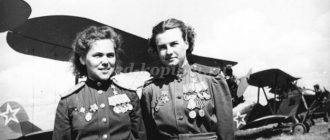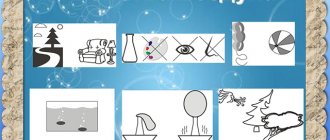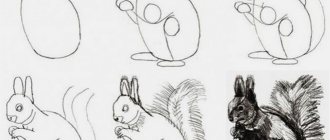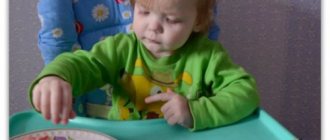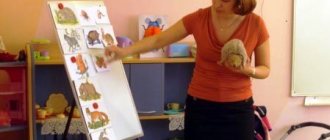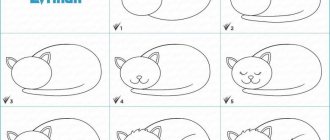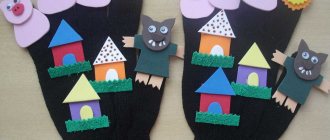During the classes
I. Org. Moment
II. Update
Introductory talk:
Teacher:
What time of year is it outside? (Spring)
What does the expression “red day of the calendar” mean? (Holiday)
Holidays are different: state and family, religious and city. For example, March 8 is a national holiday, we celebrate it throughout the country. Easter is a religious holiday because it is associated with the church calendar.
But we have a holiday that is both state and family. This is the holiday that is called “a holiday with tears in our eyes.” This is Victory Day.
What do you know about this holiday? What does the date "May 9" mean? (This is Victory Day. On May 9, 1945, our soldiers won the war against the Nazis.)
III. Preparing to understand the topic
Teacher:
Our country has experienced the greatest tragedy - war. What does “war” mean? How do you understand this word? (Horror, death, fear, loss, hunger, tears, grief)
This is what our great writer L. Tolstoy said about war: “War is the greatest misfortune that a person could invent.”
IV. Setting lesson goals and objectives
Teacher:
You and I live in a wonderful country, at a wonderful time. The sky over our country is peaceful. And this is happiness, because there is nothing worse than war in the world! And you and I live because in those distant forties our grandfathers and great-grandfathers, grandmothers and great-grandmothers sacrificed themselves.
Now it is our duty to remember this, not to forget those terrible years when millions of residents of our country demonstrated incredible fortitude, courage and bravery, courage and desperate bravery. When millions of people went to their death so that you and I could live.
V. Explanation of the topic
Teacher
: Today I invite you to take a walk into the past. It won't be an easy walk. But we need it so that we can see for ourselves what war is and what victory cost us.
VI. Application
Working with the application:
- Material:
download presentation - Table:
see application - Music in the presentation:
Chopin – E Minor Prelude
The melody of the waltz “School graduation” sounds
Teacher
: It was the summer of 1941. On June 21, high school students celebrated graduation in all schools across the country. Laughter and happiness, dreams of a wonderful future, dancing until the morning, fun. And suddenly! At dawn an ominous sound sounded...
Recording the sounds of flying airplanes and explosions.
On June 22, 1941, the fascist invaders invaded our Motherland. The war has begun. Thousands of boys and girls went straight from their prom to war.
The table begins filling (
cm. )
The table can be completed on the interactive whiteboard.
An excerpt from the song “Holy War” is played.
The defenders of the border city of Brest were the first to take the blow.
Write down the names of cities on a separate sheet. The list is updated as the conversation progresses. Name the list “Hero Cities”
Many poems have been written about the feat of the soldiers who served in the Brest Fortress, and films are still being made. In memory of those who were the first to stand up for the defense of the Motherland, the poet S. Shchipachev wrote.
1) Working with a dictionary
:
On the board are the words: Nazi invaders, Great Patriotic War, country, Motherland, Fatherland.
Questions:
. Why was the war called Patriotic? (People defended the Fatherland)
. What does Fatherland mean? (Motherland, Fatherland)
. Who are the Nazi invaders? What did they want? (These are fascists who wanted to enslave our people, force them to work for themselves. They did not recognize anyone except their nation).
. How do you understand the expression “Hero City”? (A city famous for its heroic defense in the Great Patriotic War).
Continuation of the conversation:
Teacher:
Our soldiers fought to the death. But the Nazis were well prepared for war, they had more weapons, more soldiers. Despite desperate resistance, our troops retreated further and further.
The Nazis hoped for a quick victory. They began to attack in three directions at once: towards Kyiv, towards Moscow and Leningrad, towards cities near the Black Sea.
2) Conversation:
. Why do you think the Nazis sought to immediately capture Moscow? (This is the main city of our country, the capital of the state)
. What is the name of the city of Leningrad now? (Saint Petersburg)
. Why did the Nazis want to cut off the route to the Black Sea? (They wanted to destroy the fleet)
Continuation of the conversation:
But we could not allow fascists to walk the streets of our capital. And everyone, young and old, stood up to defend Moscow. In September 1941, when the invaders were already close to Moscow, the words of commander V. Klochkov spread throughout the country: “Russia is great, but there is nowhere to retreat. Behind is Moscow!” They defended it.
An excerpt from the song “March of the Defenders of Moscow” is played.
The Nazis could not defeat Leningrad either. And for a long 871 days they chained the city in a blockade ring.
3) Working with tables and dictionaries:
A blockade is the isolation of a city in order to cut it off from the world.
Continuation of the conversation:
And on the shores of the Black Sea bloody battles broke out for every piece of land, for every ship. In this series there are many cities that made a significant contribution to the future victory: Kerch and Sevastopol, Odessa and Novorossiysk.
In 1943 a turning point came. And it all started with the battle of Stalingrad. For the first time, Soviet troops managed to win such a significant victory.
Completing the list of “Hero Cities” and the table of important dates
The Battle of Stalingrad is the largest land battle in human history. About 2 million people died in this battle. But it was our victory. And since then, February 2 has been celebrated as the Day of Military Glory of Russia.
Screening of an excerpt from the film “Stalingrad”
. What is the name of the city of Stalingrad now? (Volgograd)
. What war films have you watched?
Continuation of the conversation:
From now on, the victorious offensive of our troops begins on all fronts. The fascists began to retreat to the borders, and then our soldiers drove these conquerors through the cities of Europe, liberating them from the fascists.
An excerpt from the song “Road to Berlin” is played.
And then the spring of 1945 arrived. Our soldiers drove the Nazis all the way to Berlin. Our banner soared above the main building of the fascists - above the Reichstag. On May 9, 1945, Victory was declared!
People greeted the first day of peace with jubilation. Everyone poured out into the street. Strangers hugged each other and congratulated. They cried with happiness.
And at midnight fireworks went off in Moscow. 30 salvoes from 1000 guns announced to the world that the bloodiest and most brutal war in the world was over. And it ended with our Victory!
An excerpt from the song “May Waltz” is played.
The teacher lights a candle.
(If safety precautions require it, you can use a slide with the Eternal Flame)
Teacher:
Look at this candle. What does fire look like? What does it symbolize?
There is a fire that symbolizes memory. Look at the photo “Tomb of the Unknown Soldier in Moscow.” There is always a fire burning near this grave. And every day a guard of honor is formed. And the post is called “Post No. 1”. He is the most important and the most honorable.
. Where does the name come from: Tomb of the Unknown Soldier?
. Why does fire always burn near such graves?
. Why are there always fresh flowers near these graves?
. Is there a grave of the unknown soldier in our city?
. What monuments were erected in our city in honor of the great Victory?
. What does the inscription “Your feat is eternal” mean?
More than 20 million Soviet people died during the war. We will never forget those who defended our Motherland in these terrible days. In memory of all those who died, I ask you to stand. Let's honor their memory with a minute of silence.
The metronome sounds
Teacher:
69 years have passed since then. There are few people left who fought, who lived and worked in the rear. These are our veterans. They are heroes. It is to them that we owe the fact that we live peacefully and happily in such a beautiful country. They won our freedom.
The song "Victory Day" is playing
VII. Securing the topic. Blitz survey
Questions:
1) Name the important dates of the Great Patriotic War
2) Why is the title “Hero City” awarded?
3) List these cities.
4) What streets in our city are named in honor of the Victory? What monuments have been installed?
An excerpt from the song “Let us bow to those great years” is played.
VIII. Reflection
. What new did you learn in class today?
. How will you congratulate our veterans?
